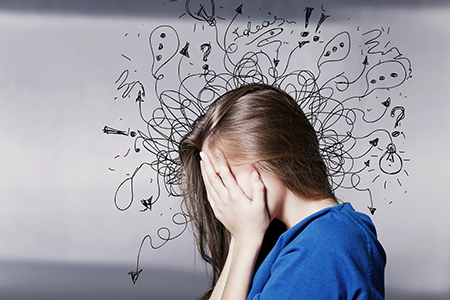Mental Health Matters

Mental health is a broad term that includes our emotional, psychological, and social well-being. It affects how we think and feel, and helps determine how we handle stress, relate to others, and make choices. A person’s mental health is affected by biological factors (genes or brain chemistry), life experiences (trauma or abuse), and/or family history.
Early Warning Signs
Experiencing one or more of the following feelings or behaviors could be an early warning sign of a mental health problem:
- Eating or sleeping too much or too little
- Pulling away from people and usual activities
- Having low or no energy
- Feeling numb or like nothing matters
- Having unexplained aches and pains
- Feeling helpless or hopeless
- Smoking, drinking, or using drugs more than usual
- Feeling unusually confused, forgetful, on edge, angry, upset, worried or scared
- Yelling or fighting with family and friends

Anxiety
Anxiety is an emotion characterized by feelings of tension, worried thoughts and physical changes like increased blood pressure. People with anxiety disorders usually have recurring unwanted or distressing thoughts and concerns. They may avoid certain situations out of worry. They may also have physical symptoms such as sweating, trembling, dizziness or a rapid heartbeat.

Depression
Depression is more than just sadness. People with depression may experience a lack of interest and pleasure in daily activities, significant weight loss or gain, insomnia or excessive sleeping, lack of energy, inability to concentrate, feelings of worthlessness or excessive guilt and recurrent thoughts of death or suicide. If you experience some of these signs and symptoms nearly every day for at least 2 weeks, you may be living with depression.

Trauma
Trauma is an emotional response to a terrible event. Immediately after the event, shock and denial are typical. Longer term reactions include unpredictable emotions, flashbacks, strained relationships, and even physical symptoms like headaches or nausea. While these feelings are normal, some people have difficulty moving on with their lives. Psychologists can help these individuals find constructive ways of managing their emotions.

Positive Mental Health
Ways to achieve and maintain positive mental health include:
- Getting professional help if needed
- Connecting with others
- Staying positive
- Getting physically active
- Helping others or volunteering
- Adequate sleep
- Developing coping skills
